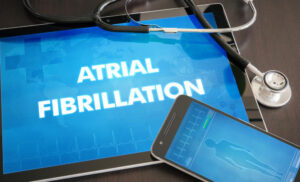
Atrial fibrillation, or AFib for short, is a heart rhythm that can cause pain and other symptoms during normal activities
This condition, if left untreated, can lead to a stroke or heart attack. The symptoms can be varied and can vary in seriousness, but are often associated with the heart's failure.
Atrial fibrillation is the result of irregular heartbeats. It can occur in people over sixty years of age, as well as in people under twenty-one years old. When a person has AFib, blood flow to the heart decreases. This decreased blood flow is then combined with a buildup of fluid in the blood vessels, causing abnormal heartbeat.
Most people with this disorder experience one or more heart attacks. However, some people who have heart attacks are completely unaware of a heart attack. While it is not uncommon for people to experience shortness of breath, there are also people who experience shortness of breath after a heart attack.
Atrial fibrillation can occur without a heart attack. However, a person is much more likely to have a seizure when the heart is not working properly. In addition to a heart attack, atrial fibrillation can also be the result of a stroke or heart attack that does not respond to immediate treatment.
When a person with AFib suffers from a heart attack, they may suffer from the effects of the heart attack, and the symptoms can last for several days. These symptoms can include shortness of breath, chest pain, dizziness, and nausea. Other symptoms that people with atrial fibrillation may experience include weakness, shortness of breath, nausea, chest pain, and abdominal discomfort. In addition, chest discomfort and a feeling of suffocation may occur.
When an individual has an attack, they will first feel pain in their chest and abdominal area, which may be felt like a heart attack. When these symptoms disappear, they will notice that the symptoms they experienced during the attack have increased.
Some individuals who have atrial fibrillation will go into shock and pass out. In most cases, the individual will awaken to find that they are unable to breathe. Because of the shock, they may lose consciousness immediately, or they may go into a coma. In rare cases, some individuals may remain awake and aware of their surroundings, but are unable to move.
There are a variety of treatment options available for individuals who have atrial fibrillation
Most patients will need to take medications that help to prevent the occurrence of a heart attack. In addition to medications, treatment can also include therapy, exercise, and other treatments that can be done to help an individual get back to normal.
Medications are one option that can help individuals who have atrial fibrillation. There are many different types of medications that can be prescribed to help individuals with this condition, including anti-arrhythmic drugs and beta blockers.
Atrial fibrillation cannot be avoided completely, as it is a medical condition that can cause death. However, if an individual does not have it and experiences an attack, they should make themselves aware of the symptoms and take the necessary precautions to ensure that they are as comfortable as possible. This can help to keep them from losing too much blood.
It is important to discuss what options you have for treatment with your doctor if you think that you may have atrial fibrillation. Some individuals may need to undergo surgery in order to treat their condition. Surgery can be one of the few treatment options, but if a person is at risk for a stroke, heart attack, or other cardiac problems, they should definitely take the time to speak with their doctor about other treatment options.
If you are experiencing any symptoms after you are diagnosed with atrial fibrillation, it is important to talk with your doctor about what options you have for treatment. You should also be aware that it may be time to speak with a health care professional in order to begin treatment.
Leave a Reply